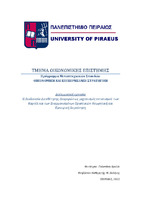Η διαδικασία διευθέτησης διαφορών ως μηχανισμός εντοπισμού των καρτέλ και των εναρμονισμένων πρακτικών : θεωρητική και εμπειρική διερεύνηση
The settlement procedure as a detection mechanism of cartels and concerted practices : theoretical and empirical investigation

View/
Abstract
This thesis aims to understand the distortions of competition, emphasizing cartels and concerted business practices. It also considers the use of the settlement procedure as a means of detecting and punishing the above practices.
In the second chapter, the competition policy is analyzed and its separation according to the object of the possible infringement, in cases concerning collusions between companies, abuse of a dominant position and merger cases. Also, the role of the competent regulatory authorities, the European Commission and the Competition Commission, their responsibilities and the procedures they follow are analyzed as well as the legal framework with which all the above must comply.
In the third chapter, the partnerships between companies are analyzed, emphasizing the analysis of collusion and cartels. Specifically, the analysis focuses on the forms of collusion between companies, the factors that influence it and the effectiveness of the methods by which companies collude. Then, an explanation of the operation of cartels follows, how companies operate as cartel members and the factors that influence their operation.
The fourth chapter concerns the settlement procedure, the concept of the settlement mechanism, the need for its establishment and the way in which it is used by businesses is clearly defined. It also provides a detailed description of how to enter the settlement procedure, when it may not start or stop, and the Competition Commission’s method of calculating fines is analysed.
The fifth chapter is the empirical analysis of the topic of this thesis and aims to analyze the relationship of the amount of the fine imposed on the companies that established a cartel with various variables. Specifically, it examines the degree of correlation of the fine in relation to the duration of operation of the established cartel, the number of companies that make it up, the existence of support from third parties and the rigging of tenders.
In the sixth chapter, the conclusions from the empirical analysis carried out, the importance of the existence of the settlement procedure and its contribution to the timely identification of the companies that committed the violation of cartel formation and the imposition of a reasonable fine are listed.

